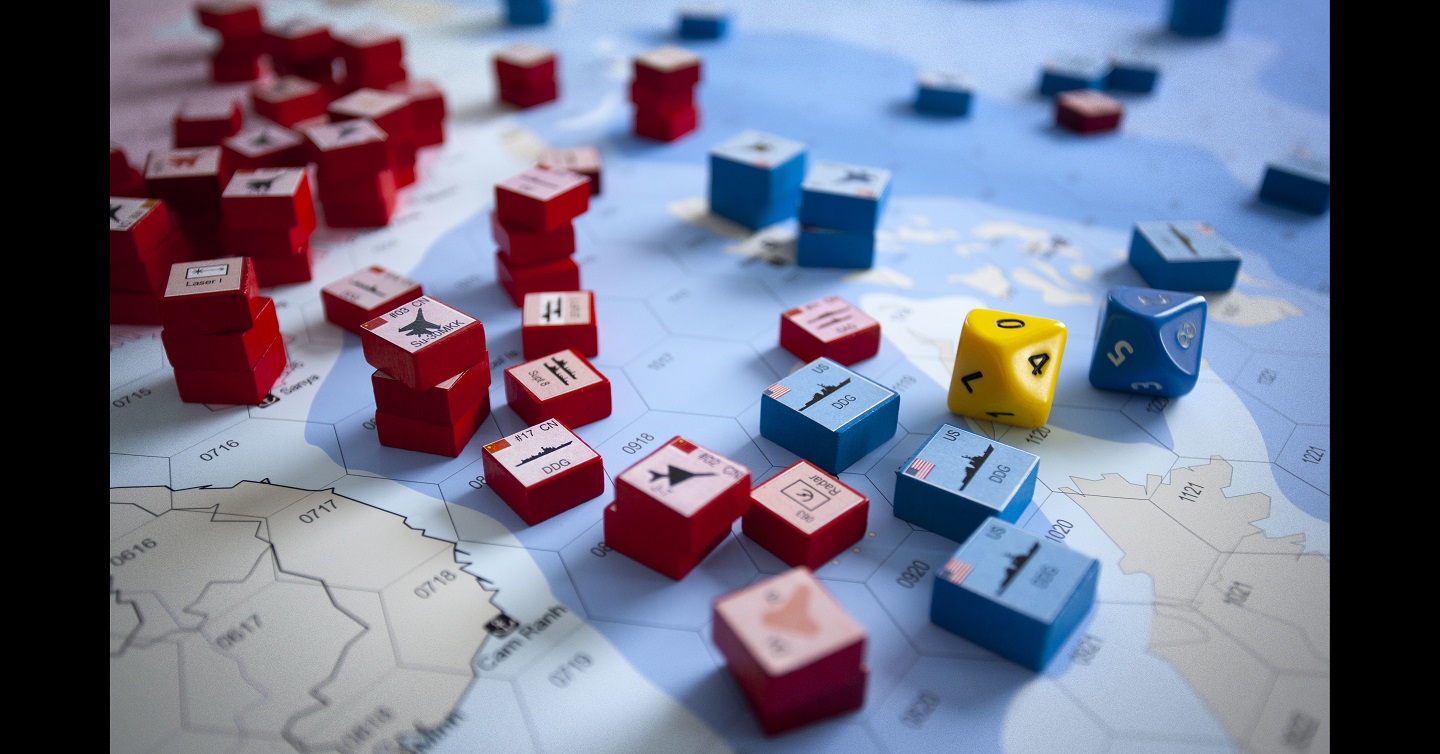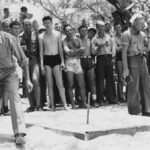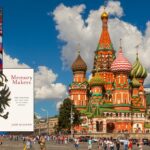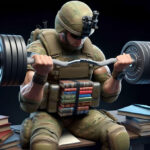
Wargames can be incredible teaching and learning tools when they are built and utilized properly. They come in all shapes, sizes and colors and require a skilled hand in their creation. A BETTER PEACE welcomes two such skilled developers, Chris Steinitz and Erin Sullivan to the studio to share their experiences as game developers and discuss how they started in the wargaming world. Chris and Erin join podcast editor Ron Granieri to talk about what makes a great wargame, what crucial information is necessary before even starting construction of a game and when you truly need a wargame versus tailored analysis.
I like to design games that can be played iteratively so that you can play it relatively quickly but play it several times and get different results each time. So then you can you’ve got several different data sets that you can compare and contrast and see what decisions were made at what points in response to which stimuli and and get a different perspective on the problem.
Podcast: Download
Subscribe: Apple Podcasts | Spotify | Amazon Music | Android | Pandora | iHeartRadio | Blubrry | Podchaser | Podcast Index | Email | TuneIn | Deezer | Youtube Music | RSS
Chris Steinitz is a Senior Research Scientist on CNA’s Gaming and Integration team and has been involved in wargaming for most of his nearly 14 years at CNA. In his varied career at CNA, Chris has also conducted studies on topics such as climate change, maritime security cooperation, coalition-building, and North Korea’s strategic calculus.
Erin Sullivan is a Research Scientist & wargamer in the Operational Warfighting Division at CNA. She holds a Bachelors in Mechanical Engineering from University of Delaware and a Ph.D. in Materials Science & Engineering from Georgia Institute of Technology.
Ron Granieri is an Associate Professor of History at the U.S. Army War College and the Editor of A BETTER PEACE.
The views expressed in this presentation are those of the speakers and do not necessarily reflect those of the U.S. Army War College, U.S. Army, or Department of Defense.
Photo Description: CNA Wargame
Photo Credit: Courtesy of CNA Headquarters, Arlington, Virginia, photo by Don Boroughs, September 2020





Could war games be developed (if they have not been so already); this, so as to help statespersons, soldiers, police and intelligence professionals deal with the problems that they will experience — both in their own home countries and abroad — this, due to their governments embarking upon worldwide — both at home and abroad — “revolutionary change”/”further modernization” political objectives?
(These such “revolutionary change”/”further modernization” political objectives being undertaken, in our case today, so as to cause the states and societies of the world [to include our own states and societies here in the U.S./the West] to become better able to interact with, better able to provide for and better able to benefit from such things as capitalism, globalization and the global economy.)
Here are some examples of the — both at home and abroad — “anti-‘revolutionary change’ “/anti-‘further modernization’ ” problems that — at this very moment — the U.S./the West’s, and other, statespersons, soldiers, police and intelligence professionals are having to deal with today:
(Herein to note how [a] the “revolutionary change”/”further modernization” political objective of these such governments; this, [b] causes the more conservative elements of the states and societies of the world — to include these such elements in one’s own home countries — to become one “natural enemies.”)
“Liberal democratic societies have, in the past few decades, undergone a series of revolutionary changes in their social and political life, which are not to the taste of all their citizens. For many of those, who might be called social conservatives, Russia has become a more agreeable society, at least in principle, than those they live in. Communist Westerners used to speak of the Soviet Union as the pioneer society of a brighter future for all. Now, the rightwing nationalists of Europe and North America admire Russia and its leader for cleaving to the past.”
(See “The American Interest” article “The Reality of Russian Soft Power” by John Lloyd and Daria Litinova.)
“For Putin, he suggests, the populist wave in Europe was a predictable response to the permissiveness of European societies, particularly with regard to immigration and gay rights. And in the rise of the right across the continent he sees an opportunity to address himself to a wider audience. ‘The Russian conservative turn . . . must be exported, and Putin sees himself as the harbinger of that anti-modernist movement.’ ”
(See the Mar 24, 2018 The Irish Times article “Inside the Mind of Vladimir Putin: Two Takes on the Russian President” by Raudhan Mac Cormaic.)
A dynamic worthy of “war gaming?”
Based on the information that I have provided in my initial comment above, might we call one of the war games thus proposed — which would be based on this such information — the “New/Reverse Cold War of Today” war game? In this “New/Reverse Cold War of Today” war game:
a. The U.S./the West, post-the Old Cold War, seeks to achieve — both at home and abroad and in the name of such thing as capitalism, globalization and the global economy — “revolutionary” political, economic, social and/or value “change.” These such changes, as Robert Gilpin notes below (and thus somewhat like communism in the Old Cold War?) threaten “traditional values, beliefs and institutions:”
“Capitalism is the most successful wealth-creating economic system that the world has ever known; no other system, as the distinguished economist Joseph Schumpeter pointed out, has benefited ‘the common people’ as much. Capitalism, he observed, creates wealth through advancing continuously to every higher levels of productivity and technological sophistication; this process requires that the ‘old’ be destroyed before the ‘new’ can take over. … This process of ‘creative destruction,’ to use Schumpeter’s term, produces many winners but also many losers, at least in the short term, and poses a serious threat to traditional social values, beliefs, and institutions.” (From the book “The Challenge of the Global Capitalism: The World Economy in the 21st Century,” by Robert Gilpin, see the very first page of the Introduction chapter.)
b. In response to this such existential threat, the U.S./the West’s both at home and abroad adversaries, today, seek to (a) prevent these such revolutionary changes from taking place (think “containment”) and/or seek to (b) reverse such unwanted changes as have already occurred (think “roll back”).
(Note: One of the key elements that the U.S./the West’s both at home and abroad adversaries use today — to achieve their such “containment” and “roll back” of “revolutionary change” objectives — this is their “natural allies,” to wit: the more conservative/the more no-change and/or reverse change elements of the world’s populations. These such conservative elements, after all, being what the U.S./the West extensively relied upon, re: our “containment” and “roll back” strategies versus the Soviets/the communists, back in Old Cold War days.)
Conclusion:
Without a doubt, many of the problems that U.S./Western governments face today — and thus their statespersons, their soldiers, and their police and the intelligence professionals — these stem for the “revolutionary change” political objective of the U.S./the West post-the Old Cold War.
Given this such observation, might not U.S./Western statespersons, soldiers, police and intelligence professional, today, benefit from a “New/Reverse Cold War of Today” war game? One which challenges them to solve the problem that the Soviets/the communists could not. This being, how to achieve “revolutionary” political, economic, social and/or value “change” — both at home and abroad — this, in the face of “conservative” resistance to same — both at home and abroad?